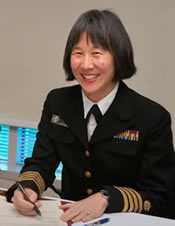CDC Women in STEM Careers - Denise Koo, MD, MPH
Director
Captain, U.S. Public Health Service
Division of Scientific Education and Professional Development, Office of Public Health Scientific Services, CDC
 Denise Koo came from a family of scientists who were also high achievers. Naturally, she was expected to follow the same path. She ended up in medical school but found it boring—too much memorization, and medical research was too abstract.
Denise Koo came from a family of scientists who were also high achievers. Naturally, she was expected to follow the same path. She ended up in medical school but found it boring—too much memorization, and medical research was too abstract.
She considered quitting, but toward the end of her first year of medical school, she took a class in epidemiology (the study of the cause of disease in a group of people)—and realized she had found her niche.
As soon as she finished medical school, she says, “I came to CDC through a program for health professionals interested in epidemiology: the Epidemic Intelligence Service. I loved solving the mysteries of disease epidemics. I loved public health science because it’s fascinating and makes a difference.”
Saved from Quitting
I grew up in a stereotypical Asian family. One grandfather was a poor peasant in China who became a physicist. The other grandfather was a marine biologist. Their wives were also college science majors. My father was a chemical engineer, and my mother was a chemistry major in college. To my family, science and discovery were the highest calling.
It wasn’t family pressure that led me to science. As a kid I loved science and math because the answers were clear-cut. When I got to college I was intrigued by molecular biology (the study of molecules in living things) and planned to get a PhD in it. But after spending my summers in college working in laboratories, I knew basic science wasn’t my passion. I needed something more people-oriented and more applied.
That’s how I ended up in medical school. Luckily for me, our first-year class in epidemiology saved me from quitting. The professor explained to us, “A doctor tries to figure out what disease a patient has, whereas an epidemiologist tries to figure out what kind of person is most likely to have a disease.” At last, here was a branch of science that focused on improving health—not just patching up a person. I stayed in medical school to make sure I understood models of illness.
Opportunities to Learn and Inspire Others
"As an epidemiologist, I enjoy math and statistics, as well as talking to people. We find out what their eating habits are, where they’ve been, and what sorts of things in the environment affect them. Then we figure out how to prevent more people from getting sick."
As an epidemiologist, I have gotten to do awesome research, travel to many countries, and work with people from many backgrounds.
I am currently based in the CDC Policy Office and have been working on issues related to public health and healthcare collaboration. Our team is working on developing tools and resources aimed at improving community health and well-being. I enjoy using my scientific and management background and find it very useful.
I never miss a chance to tell people how public health science can make a difference. I volunteer at my children’s schools and try to introduce kids to public health at a young age by having them do fun exercises.
What inspires me most now is that we have a chance to turn our health care system into a health system—improving health rather than waiting for people to get sick and then try to fix them. Most Americans don’t know that health care is only one piece of the puzzle. Where we work, live, study, and play affects our health even more than visits to doctors and other health professionals do.
I am thrilled to have the chance to train young professionals who will become tomorrow’s public health leaders.
Advice to Girls and Young Women
- There are many flavors of math and science, so find the one that is best for you. What’s the best blend of analytical and people work? What values fit you and what you want to do? Academic science is different from science in business or government. I love public health science because it’s fascinating and makes a difference.
- Keep up your nontechnical skills. Scientists who want to contribute to the world must be able to work in teams, be leaders, and be great
- Page last reviewed: March 9, 2015
- Page last updated: March 9, 2015
- Content source:


 ShareCompartir
ShareCompartir